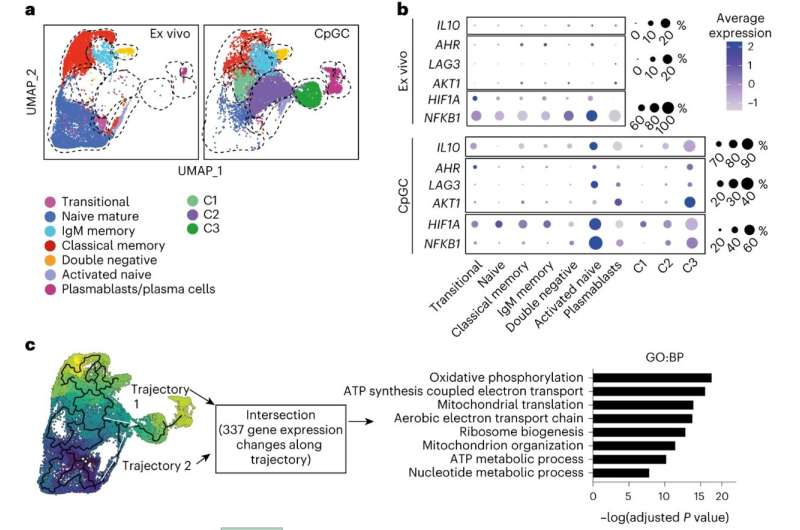This article has been reviewed according to Science X's editorial process and policies. Editors have highlighted the following attributes while ensuring the content's credibility:
fact-checked
peer-reviewed publication
trusted source
proofread
Harnessing B cells could fight cancer or autoimmune diseases by targeting mitochondrial metabolism

White cells called regulatory B cells could be harnessed to fight cancers and to treat autoimmune diseases by either increasing or decreasing their function, as indicated by a new research.
In a new study published in Nature Immunology researchers from UCL, in collaboration with researchers from the University of Birmingham and the University of Surrey have found that regulatory B cells which are essential for regulating the human immune system rely on a protein called Thioredoxin (Trx) for proper function.
Through study of samples of B cells taken from healthy donors and patients with an autoimmune condition called Lupus (SLE), the teams were able to identify how Trx is required for the immune suppressive functions of regulatory B cells, and represents a potential therapeutic target for autoimmune diseases.
In addition, the same process of regulating Trx to control B cell function could help treat cancers through inhibiting regulatory B cell function.
Claudia Mauri, professor of immunology at UCL and leader of the study said, "B cells are a vital part of the immune system and have long been considered a potential avenue for autoimmune and cancer treatment. They are also versatile, and can be manipulated to differentiate in a number of different types including regulatory B cells.
"Our team investigated the energy requirements of various B cell populations and discovered that Bregs depend on mitochondrial electron transport and produce moderate levels of reactive oxygen species (ROS). Unregulated ROS release can damage mitochondria, leading to cellular and tissue injury."
"In our latest study, we have identified the metabolic demands of these important B cell subset, and the key protein Trx involved in maintaining metabolic balance so that they can help fight disease and pathogens in the body. Through our work with blood taken from lupus patients, we can also see how a deficiency in Trx resulting in the Breg cells not working properly which is a feature of these patients.
"Crucially, we can also see that Trx supplementation can turn that around."
Power imbalance
Regulatory B cells are reliant on a sweet spot of energy supplied by cellular power supply, called mitochondria; as well as a "sweet spot" of reactive oxygen species (ROS) produced by the mitochondria, and problems with this balance leads to B cells becoming pro-inflammatory.
The study found that insufficient levels of the Trx protein in Breg cells of SLE patients led to loss of function in the channel that feeds energy into cells from the mitochondria and as a result increased levels of ROS. Results from the analysis of lupus patients' blood samples found that Breg cells showed the tell-tale signs of incorrectly functioning mitochondria and increased ROS, alongside lower levels of the Trx protein.
Claudio Mauro, professor of metabolism and inflammation in the Institute of Inflammation at the University of Birmingham co-author of the paper said, "During an immune response, B cells play critical roles in fighting infections by producing antibodies, pro-inflammatory cytokines, and by supporting the development of other inflammatory immune cells.
"Concurrently, a subset of B cells known as regulatory B cells (Bregs) suppresses excessive inflammation that may arise from unresolved infections. Maintaining a balance between different B cell types is crucial for overall health.
"This studies further highlights how metabolism of immune cells is a target for potential novel therapies and we are working in this space with this and other projects to deliver impact for the people benefits in the near future."
More information: Hannah F. Bradford et al, Thioredoxin is a metabolic rheostat controlling regulatory B cells, Nature Immunology (2024). DOI: 10.1038/s41590-024-01798-w


















